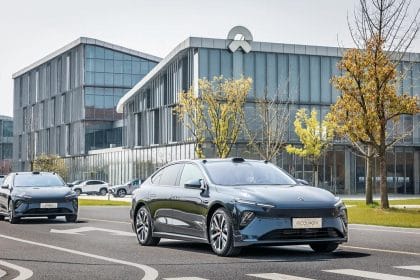Nio has confirmed its intention to carry out a third listing in Singapore, in addition to its US and Hong Kong listings.
Chinese electric vehicle carmaker Nio (NYSE: NIO) announced on Friday that it is planning a secondary listing in Singapore. Currently listed on the New York Stock Exchange, Nio launched a secondary listing in Hong Kong in March. Launching in Singapore would make the country the third exchange that would host the Shanghai-based EV manufacturer’s shares.
Nio’s planned Singapore move comes amid a possible action to delist Chinese companies that are public in America. The Securities and Exchange Commission (SEC) recently added more than 80 Chinese companies, including Nio, to a list of entities facing expulsion from American exchanges. Other notable names on the provisional lineup include prominent tech players JD.com, Pinduoduo, Bilibili, and NetEase.
To neutralize the risk of delisting, several leading US-listed Chinese companies have carried out secondary listings in Hong Kong. Examples of such companies are e-commerce powerhouse Alibaba as well as JD.com. Even though Nio has also followed suit in Hong Kong, its prospective Singapore listing is still a rare move. This is because most other Chinese firms are yet to list in Singapore.
Nio Singapore Listing
For its third listing, Nio will offer Class A ordinary shares valued at US$0.00025 per share in Singapore. On Thursday, the EV company received a conditional eligibility-to-list letter from the Singapore Exchange Securities Trading Limited. Furthermore, pursuant to the listing, Nio’s stock offer would be via introduction. This means that the Chinese electric vehicle manufacturer would not be selling new shares or raising fresh capital. In addition, Nio’s shares would also be fully fungible with the American depositary shares listed on the New York Stock Exchange. A clause in the letter from the Singaporean bourse which directly addressed Nio’s “introduction” stock offer read:
“This press release shall not constitute an offer to sell or the solicitation of an offer or an invitation to buy any securities of the Company, nor shall there be any offer or sale of the securities in any state or other jurisdiction in which such offer, solicitation or sale would be unlawful prior to the registration or qualification under the securities laws of any such state or other jurisdiction.”
Nio Looks to Still Sustain US & Hong Kong Listings
Earlier this week, Nio stated that it wants to maintain its prior listings in both the US and Hong Kong. In addition, the company also expressed a commitment to protecting its stakeholders’ interests.
In Singapore, Nio would join 26 other companies with secondary listings, including Jardine Matheson Holdings Ltd., IHH Healthcare Bhd., and Top Glove Corp. As of the end of March, the total market cap for secondary-listed securities stood at 221 billion Singaporean dollars, or $159 billion. This figure also represented around 24% of the total market capitalization.
Nio’s rivals Xpeng and Li Auto are both public in Hong Kong through a dual primary listing. However, so far, it is not clear whether both Chinese electric vehicle carmakers also intend to carry out listings in Singapore.
next